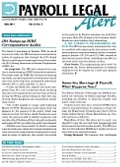Questions regarding overtime and holiday pay commonly arise this time of year, especially if employees are trying to pack in the overtime because they can deduct it. If you need to hire temporary help to get through the holiday crunch, or even if you don’t, there are some sneaky wage-and-hour traps to watch out for. If you stick to these nine key rules, the holiday season will run smoothly for you and your employees.
One early dismissal rule. Employees are often dismissed with pay on the afternoons of Thanksgiving, Christmas Eve and New Year’s Eve. For nonexempt employees, this is idle time, and it creates a dilemma for you—how do you code this time in the payroll system? Rule #1: Set up a separate pay code. You can call it Holiday Pay, Paid Not Worked or something else.
Four holiday pay rules. The Friday after Thanksgiving isn’t called Black Friday for nothing—employees who aren’t working are at the mall or home at their computers shopping. Rule #2: The Fair Labor Standards Act doesn’t require you to pay employees for holidays. So nonexempts who normally work 10-hour days can be paid for eight holiday hours. Remember to code this pay appropriately.
If nonexempts receive holiday pay and they also work overtime during the same week, don’t factor the holiday pay into their regular rate calculation as you figure their overtime rates. Rule #3: Holiday pay is idle-time pay, which is excluded from the regular rate calculation.
If you close for a holiday and you have a bona fide benefits plan, you can require exempts to take accrued time off, provided they receive the equivalent of their guaranteed weekly salary. Rule #4: Exempts who run out of accrued time due to current debiting and those who have already run out of time must be paid their full salaries.
If you shut down for a week, you needn’t pay exempts anything. Rule #5: Exempts don’t need to be paid if they don’t work for a week. They may use vacation time, if they have it.
Two holiday work rules. If you’re open for business, you must pay employees. But you can save on overtime by making some changes to your pay policies. Employees, on the other hand, may object to not receiving overtime. Consider Rules #6 and #7:
- You don’t have to include holiday pay in the regular rate calculation for nonexempts who work through a holiday if they receive their regular wages in addition to their holiday pay. But you can’t credit this holiday pay against your obligation to pay overtime.
- If, instead of employees receiving their normal wages plus holiday pay, they exchange the holiday pay for at least time-and-a-half for holiday work, you can credit the time-and-a-half premium pay against your obligation to pay overtime.
Two holiday hiring rules. Temps are employees. Rule #8: They must complete W-4s and I-9s, be reported to the state as new hires and receive W-2s. Tips: Ask to see their Social Security cards and photocopy them for your records. Then use the Social Security Administration’s Social Security Number Verification Service to confirm that their names and Social Security numbers match. Rule #9: Temps who consent may be enrolled in your direct deposit or paycard program; provide them with appropriate explanatory material.

